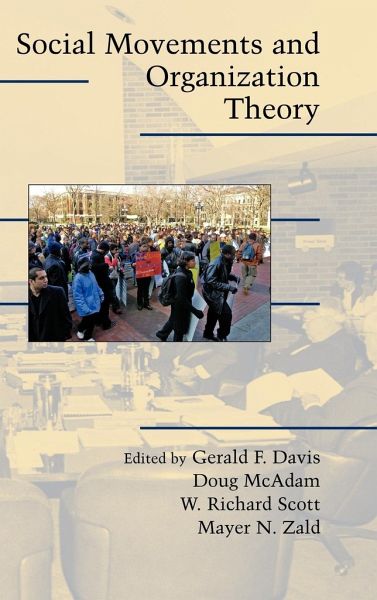Social Movements and Organization Theory
Versandkostenfrei!
Versandfertig in 1-2 Wochen
Weitere Ausgaben:

PAYBACK Punkte
46 °P sammeln!




Although the fields of organization theory and social movement theory have long been viewed as belonging to different worlds, recent events have intervened, reminding us that organizations are becoming more movement-like and volatile and politicized while movements are more likely to borrow strategies from organizations. Topics covered in this volume range from globalization and transnational social movement organizations to community recycling programs.
Gerald Davis received his PhD in Organizational Behavior at Stanford University's Graduate School of Business and subsequently taught at the Kellogg Graduate School of Management at Northwestern University and at Columbia University's Graduate School of Business. He spent academic year 1997/1998 as a Fellow at the Center for Advanced Study in the Behavioral Sciences at Stanford, and has been at the University of Michigan since then. Davis's research examines the influence of politics and social networks on the evolution and structure of the institutions of corporate governance, and conversely on the influences of financial globalization on social structure and politics. His work has appeared in the Administrative Science Quarterly, the American Journal of Sociology, the American Sociological Review, the Journal of Personality and Social Psychology, Research in Organization Behavior, Strategic Organization, and elsewhere. In 2003 he was elected to be Chair of the Organization and Management Theory Division of the Academy of Management. He is also a member of the American Sociological Association and serves on the editorial boards of Administrative Science Quarterly and Strategic Organization.
Doug McAdam is Professor of Sociology at Stanford University and Director of the Center for Advanced Study in the Behavioral Sciences. He is the author or co-author of ten books and more than 50 articles in the area of political sociology, with a special emphasis on the study of social movements and revolutions. Among his best known works are Political Process and the Development of Black Insurgency, 1930-1970, a new edition of which was published in 1999 (University of Chicago Press), Freedom Summer (1988, Oxford University Press), which was awarded the 1990 C. Wright Mills Award as well as being a finalist for the American Sociological Association's best book prize for 1991. His most recent book is Dynamics of Contention (2001, Cambridge University Press), with Sid Tarrow and Charles Tilly. He was elected to membership in the American Academy of Arts and Sciences in 2003.
W. Richard Scott received his Ph.D degree from the University of Chicago. He is now Professor Emeritus of Sociology, with courtesy appointments in the School of Business, School of Education, and School of Medicine, at Stanford University. He is the author or editor of more than twenty books, the most recent being Institutional Change and Healthcare Organizations 2002, with Ruef, Mendel and Caronna; Institutions and Organizations, 2001 (2nd ed), and Organizations: Rational, Natural and Open Systems 2003 (5th ed).
Mayer N. Zald is a member of the American Academy of Arts and Sciences. He has been Chairman of the Section on Occupations, Organizations and Work and the Section on Collective Behavior and Social Movements, both of the American Sociological Association. He has also been Vice-President and a Council Member of the ASA. A two time Fellow of the Center for Advanced Studies in the Behavioral Sciences, he is the author of numerous books and articles, including Organizational Change: The Political Economy of the YMCA (Chicago, 1970) and editor (with Doug McAdam and John McCarthy) of Comparative Perspectives on Social Movements (Cambridge, 1996).
Doug McAdam is Professor of Sociology at Stanford University and Director of the Center for Advanced Study in the Behavioral Sciences. He is the author or co-author of ten books and more than 50 articles in the area of political sociology, with a special emphasis on the study of social movements and revolutions. Among his best known works are Political Process and the Development of Black Insurgency, 1930-1970, a new edition of which was published in 1999 (University of Chicago Press), Freedom Summer (1988, Oxford University Press), which was awarded the 1990 C. Wright Mills Award as well as being a finalist for the American Sociological Association's best book prize for 1991. His most recent book is Dynamics of Contention (2001, Cambridge University Press), with Sid Tarrow and Charles Tilly. He was elected to membership in the American Academy of Arts and Sciences in 2003.
W. Richard Scott received his Ph.D degree from the University of Chicago. He is now Professor Emeritus of Sociology, with courtesy appointments in the School of Business, School of Education, and School of Medicine, at Stanford University. He is the author or editor of more than twenty books, the most recent being Institutional Change and Healthcare Organizations 2002, with Ruef, Mendel and Caronna; Institutions and Organizations, 2001 (2nd ed), and Organizations: Rational, Natural and Open Systems 2003 (5th ed).
Mayer N. Zald is a member of the American Academy of Arts and Sciences. He has been Chairman of the Section on Occupations, Organizations and Work and the Section on Collective Behavior and Social Movements, both of the American Sociological Association. He has also been Vice-President and a Council Member of the ASA. A two time Fellow of the Center for Advanced Studies in the Behavioral Sciences, he is the author of numerous books and articles, including Organizational Change: The Political Economy of the YMCA (Chicago, 1970) and editor (with Doug McAdam and John McCarthy) of Comparative Perspectives on Social Movements (Cambridge, 1996).
Produktdetails
- Verlag: Cambridge University Press
- Seitenzahl: 456
- Erscheinungstermin: 18. April 2009
- Englisch
- Abmessung: 235mm x 157mm x 31mm
- Gewicht: 886g
- ISBN-13: 9780521839495
- ISBN-10: 0521839491
- Artikelnr.: 21402415
Herstellerkennzeichnung
Libri GmbH
Europaallee 1
36244 Bad Hersfeld
gpsr@libri.de
Für dieses Produkt wurde noch keine Bewertung abgegeben. Wir würden uns sehr freuen, wenn du die erste Bewertung schreibst!
Eine Bewertung schreiben
Eine Bewertung schreiben
Andere Kunden interessierten sich für














